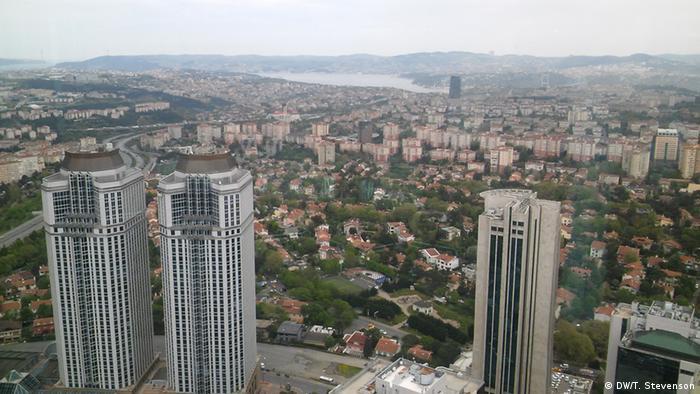Published by Deutsche Welle 13 April 2016
Many Turks would still like to see their country join the EU, but European intransigence and resurgent nationalism in Turkey have pushed accession talks to near irrelevance. Tom Stevenson reports from Istanbul.
It’s been almost 30 years since Turkey first applied to join the European Union in April 1987 but for residents of Istanbul the prospect of joining the union looks so unlikely as to be worthy of little consideration.
So far only one chapter has been successfully closed out of a total of 33 that must be negotiated before a vote on Turkey’s accession is possible. There are currently 14 chapters open and nominally under discussion, however few believe progress on any is just over the horizon.
In Istanbul, there is support for the idea of Turkey joining the EU, but the question is often seen as hypothetical, if not academic.
“Joining the EU would be great, of course,” said Ali Erdem, a shopkeeper in Istanbul’s Tophane district, “but with this government in charge it won’t happen.”
“Those in charge at the moment can’t even manage to represent their own people here – how could they represent us in Europe?”
Extensive relationship
Despite the lack of progress on EU accession, Turkey and Europe maintain an extensive relationshipboth politically and economically, and recently reached an agreement for Turkey to resettle failed asylum seekers who have been deported from Europe in return for financial support amounting to around 3 billion euros ($3.4 billion). Interestingly, so far only 95 million euros have been dispersed.
In February a leaked report confirmed that the EU even delayed its human rights report on Turkey until after national elections in November 2015 at the request of Turkish President Recep Tayyip Erdogan. Erdogan’s Justice and Development Party (AKP) went on to win the elections.
The opposition in Turkey has often been critical of the EU’s dealings with the ruling AKP. Selahattin Demirtas, the leader of the pro-Kurdish People’s Democratic Party (HDP), claimed in December that the EU was “covering up the crimes of the AKP government” and “turning a blind eye to all violations of human rights” in order to strike a deal with Turkey on resettling refugees.
Many nonetheless see the advantages of Turkey joining the EU. “There would be many mutual benefits to integration – Turkey is a major power in this part of the world which would be a benefit to Europe,” said Huseyin Ozkaya, the CEO of Turkey’s Odeabank.
 Many Turks are still in favor of joining the EU, but doubt that this will happen under the current government
Many Turks are still in favor of joining the EU, but doubt that this will happen under the current government
“At some point I think it will happen but there’s a long way to go – we would like to see it progress a little faster,” Ozkaya told DW. “But EU integration is just not that relevant at the moment to my perspective.”
Nationalism rears its head
The AKP has been adopting increasing nationalist rhetoric both in its international relations and in its military campaign against a Kurdish insurgency in the south-east of Turkey that often looks at odds with the spirit of EU integration.
“In a way I suppose I never believed that EU would be willing to take Turkey,” said Hale Tenger, an artist based in Istanbul. “However I always thought it would be to Turkey’s benefit to continue the process in terms of democratic improvements, like freedom of speech.”
“Lately that isn’t working as the EU has been very quiet about the injustices and corruption going on in Turkey. Their only concerns appears to be stopping the flow of refugees into Europe and sending the refugees back, which I find dishonest,” Tenger told DW.
Lip service
Experts point out that the government is not really serious about its accession ambitions.
“The Turkish government is merely paying lip service to the idea of EU accession at this point,” says Cengiz Aktar, a political scientist and senior scholar at the Istanbul Policy Center, and an expert on EU-Turkey relations.
Aktar points out that while the environment accession chapter is currently under discussion, the Turkish government has repeatedly cracked down on environmental activists. “Probably one of the groups which is the most harshly harassed is the environmentalists: every time they go out and criticize the public authorities they are beaten,” Aktar told DW.
“This tells you a lot about the state of affairs regarding the negotiations.”
As for the EU, Aktar says the member states are more than happy that Turkey is not complying with the accession criteria.
“All this is a joke. The Turkish government is not interested in EU norms, principles, or standards because they are in total contradiction with what the Turkish government does and intends for society.”
The Turkish government is also currently attempting to negotiate a visa waiver deal with the EU that would allow Turkish nationals to visit and travel in Europe more easily. Last week, Prime Minister Ahmet Davutoğlu claimed that Turkey had implemented 43 out of 73 requirements for visa exemption.
However many of the compliance laws needed to see an agreement on a visa waiver appear to have been rushed through, and there are questions as to whether they will stand up to scrutiny – particularly with rising support in Europe for right-wing parties in Germany and France that are hostile to an opening with Turkey.
Meanwhile, Aktar says, the EU-Turkey migrant deal has raised doubts over Europe’s own commitment to its principles and standards.
“This deal, which means deporting people without proper consideration of their conditions, is totally against international humanitarian law, and against EU regulations on asylum. It’s a tragedy and refugees are suffering for it.”



